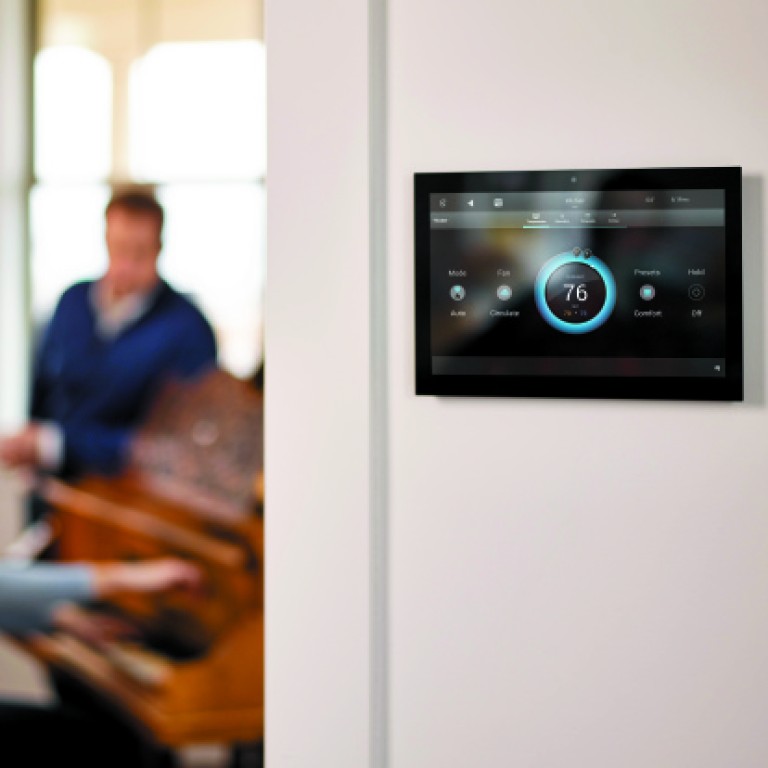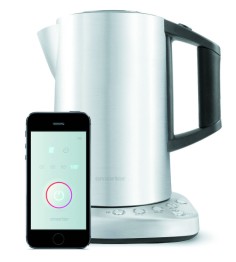Smart homes and smart appliances are the new household trend

In this day and age, you can almost do anything with just a tap of your fingers. From online banking to online shopping, there's very little we can't control from our smartphones.
Even home appliances, such as kettles, coffee machines and vacuum cleaners, have gone smart. No longer is physical human interaction required - with the right mobile phone app, we can brew a morning cup of java without leaving the warm comforts of our bed, start slow-roasting our dinner from the office or have a little robot clean our house while we're tucked away in bed.
The word "smart" is thrown around a lot when describing these convenient pieces of appliances. This begs the question: what actually makes these appliances "smart"?
"The technical term of smart could mean many things," says Graham Donald, motor engineer at Dyson. "We like to think the smartness around [the products] comes from the fundamental design. Every little feature we add to the products make it come across as smart to the user, but this is [after] thousands of hours of testing and thousands of hours of engineering."

The Dyson 360eye, for example, is an "intelligent robot … with 360-degree vision technology". After 16 years of intensive research and development, Dyson is launching the new robot vacuum cleaner in Tokyo this month. It is set to hit Hong Kong markets next year.
Of the new model, James Dyson, founder of Dyson, says: "We've developed a unique 360-degree vision system that lets our robot see where it is, where it has been, and where it is yet to clean."
These details can be monitored on the accompanying phone app. "You can use the app to [check] the [robot's] performance - how well it has cleaned, how efficient it is, and [if there are] any faults with the robot, you will also be informed," Donald adds.
For the kitchen, British company Smarter's iKettle, touted as the world's first Wi-fi kettle, is another option available in the market. When connected to Wi-fi, users can boil water or brew a cup of tea with just a tap of their phone screen.

For those looking to control their appliances even when they are not home, Belkin has teamed up with WeMo in creating the Crock-Pot Smart Slow Cooker and Mr. Coffee Smart Coffee Maker. The phone app allows users remote access to their slow cooker and coffee machine. It lets them schedule and monitor processes, change the temperature and operate other functions.
To be a "smart" product, then, it seems the product has to be convenient. Yet each application may come with its own application - which, if anything, then becomes more of a hassle.
For those looking to streamline their connected products, there are many options in the market to install home-automated systems, such as Control4, Loxone, Crestron and NuBryte, which allow full integration of temperature and lighting control, home entertainment and security, among other things.
"Instead of 20 different apps for 20 different devices, [systems like] Control4 make everything work together in one cohesive system from one place," says Paul Williams, vice-president of comfort and lighting.
Beyond that, making your home smart comes with a plethora of benefits.
"Today, you can make almost every aspect of your house smart," Williams adds, citing standalone products such as the aforementioned, and incorporating technology into the infrastructure of the home. From sensors on pipes that can alert home users when there is a leak to automated shades that make adjustments based on the time or position of the sun to help conserve energy, the options are endless.

Further, "Smart homes offer you 24/7 access to your home, so you have peace of mind knowing exactly what's going on even if you're not there," says Phillipp Schuster, managing director of Loxone UK.
With a fully automated system, the system "can monitor and respond automatically to things in and around the house: light levels, temperature conditions, fire, burst water pipes and more", Schuster adds. "It sends out instant alerts if something is not right at home."
Both Control4 and Loxone use apps, compatible with Android and iOS, to control appliances around the home. To Schuster and Williams, it is the system rather than the products themselves which makes the home smart. "We believe that switches and sensors are the eyes and ears of a smart home, and our recommendation is to have a switch, temperature sensor and motion sensor in every room, as well as door and window contacts on all doors and windows that are on the ground floor or are easily accessible," Schuster says.
Beyond convenience, having phone-controlled appliances can also bring extra safety features for the home. There's no longer the need to worry if you've forgotten to turn off the hob or hair straightener, he adds.

While Dyson's latest product runs as a standalone product, with the control features integrated into the product itself, Donald is optimistic about the future. "Looking ahead, there is a possibility that they can be integrated into a Dyson application," he says.
However, he is cautious. "Apps are for the added benefit of the product only. We don't want to add a feature in there just because connectivity is available to us."
That said, the future is looking bright for the industry. "The market is awash with options for introducing smart technology into your home," Schuster says.
"As the awareness of smart-home technology grows and energy prices continue to rise, more homeowners are demanding solutions to optimise the way they run their homes."
Williams is just as excitedly ambitious. "We believe smart homes will eventually become the new norm," he says.
How safe is your smart home? The benefits of a technology-enhanced home are certainly aplenty, but it's easy to understand why one might feel at risk when so much data and information is available in the virtual world.
"Hacking is not a new concept in the digital age," says Philipp Schuster, managing director of Loxone UK. "But the presence of hackers in the home technology sphere is sparking discussions over the safety of smart homes."
That said, there are simple steps which can be taken to ensure your home remains out of reach of hackers. Paul Williams, Control4's vice-president of lighting and comfort, offers an easy tip. "Use complex passwords. If your password is 'Password1', it is definitely time to update it," he says.
Another tip is to install a firewall and disable port forwarding on your network router.
Schuster agrees and adds: "If you do decide to have remote access to your home, then consider setting up a virtual private network [VPN] rather than opening ports in your router."
He stresses it is also important to properly consider the amount of technology you are integrating into your home. "Consider need versus security," Schuster says.
While integration of technology - such as webcams to monitor the home when you're out and about - can certainly make a house savvier, he says there are less intrusive options. "If you are worried about intruders, presence sensors work very well as part of an integrated alarm system, [without the need for] webcams."
Beyond hacking, there is also a realistic concern that appliances being switched on and used without human supervision might run haywire. However, Graham Donald, motor engineer for Dyson, stresses that each product available in the market will have gone through stages and stages of trials and beta testing. "We design to avoid failures," he says. "From an engineering point of view, [Dyson] has a system called failure modes analysis. We brainstorm and think of any possibility which could happen to a product - whether it's autonomous or not."
Want more articles like this? Follow STYLE on Facebook

With smartphone apps, we can have 24/7 access to our homes